Bart: Go, Dad, go!
Lisa: How doth the hero, strong and brave, a celestial path to the heavens paved!
(The family stares at her.)
Lisa (dejected): Go, Dad, go. -The Simpsons
Last week, I got a question from one of my online friends, cmgraves. His question was straightforward:
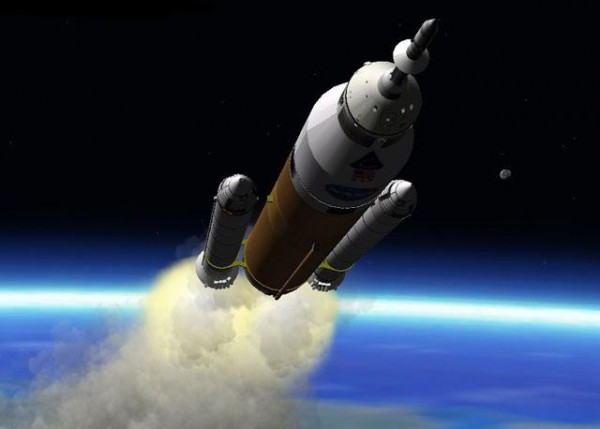
How do thrusters work in space? On Earth, when we want to speed up, slow down, change our direction, or to change our motion in general, we always have something to push against. This is true whether you're a runner and have the ground to push against,

or a turbofan engine with the air to push against.
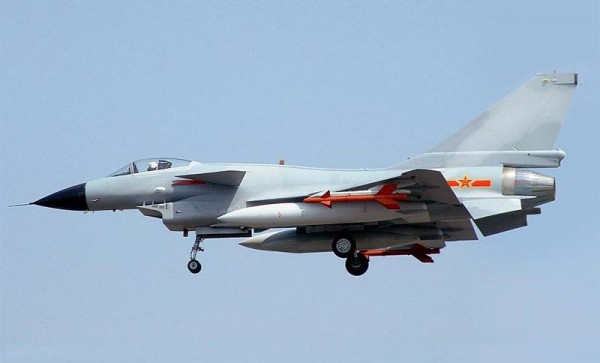
But in the vacuum of space, your attempts to fly a plane would fail just as surely as your attempts to run, since there's nothing to push against! How, then, is it possible to change your motion in space?
In other words, how do thrusters work? Take a look at the image below.
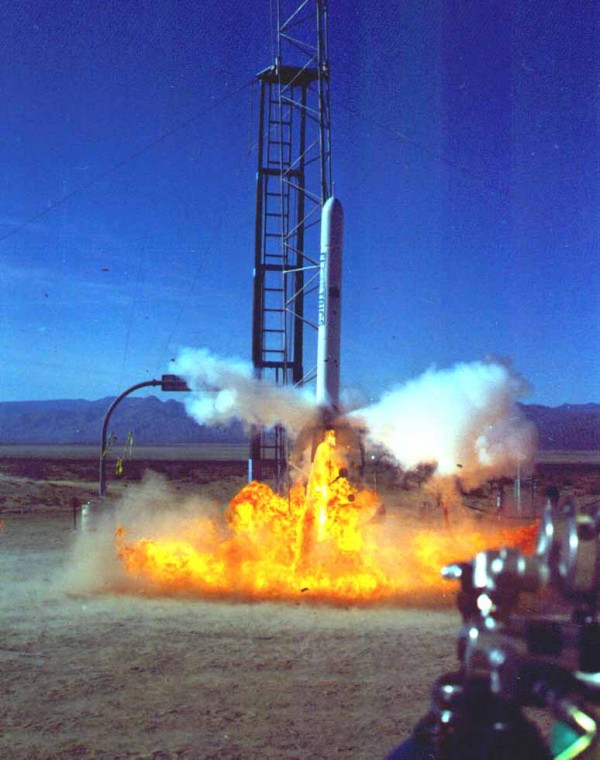
This is what happens when you explode a little bit of rocket fuel inside that rocket. Note the big difference between what happens here, inside of a rocket, and what happens when you just blow up something up on its own.
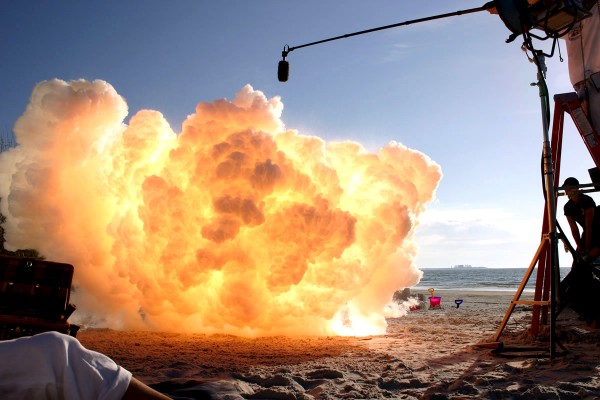
If I just let something explode, the explosion is going to move spherically outwards. For every little bit that moves to the left, there's a little corresponding chunk that moves to the right. For every gram that moves up with a certain velocity, there's a corresponding amount that moves down with a certain velocity. This is what we call the conservation of momentum.
But if I have a controlled explosion, I can spew all of that combusted fuel out -- at a very high speed -- in one direction.

But now, all of that high-velocity, combusted fuel gets blown out in a controlled direction! And if I want to accelerate, all I have to do is point my thruster in the opposite direction I want to move, burn a little fuel, and I'm done!
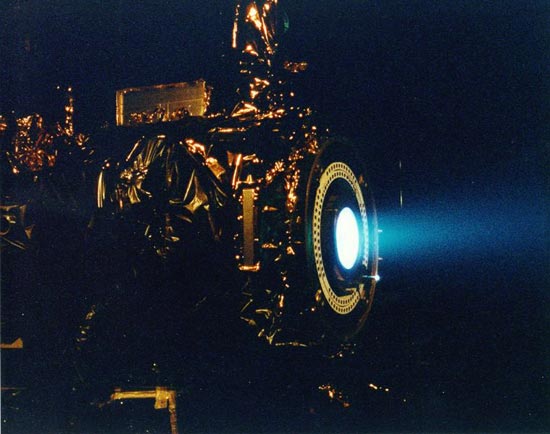
This is the same reason why, when you fire a rifle, there's a large kickback that throws you backwards. There's an explosion that goes on inside of the gun, part of the energy propels the bullet forwards (out of the barrel) at a certain velocity, and part of the energy propels the gun and everything it's attached to (including you) backwards at a different, smaller velocity.
(Any bet as to how far we'll get in the comments before the inevitable joke about farts in space?)

Newton's third law: law of reciprocal actions
Lex III: Actioni contrariam semper et æqualem esse reactionem: sive corporum duorum actiones in se mutuo semper esse æquales et in partes contrarias dirigi.
''To every action there is always an equal and opposite reaction: or the forces of two bodies on each other are always equal and are directed in opposite directions''.
http://en.wikipedia.org/wiki/Newton%27s_laws_of_motion
So when do we get one about Ion thrusters?
In space, no one can hear you fart!
There, I did it ;-)
Did anybody notice that very last guy? The recoil knocks his pants off?
Hey Mr "Starts with a Bang"
What happened to the recoil of the Big Bang? How is conservation of momentum accounted for?
*BZZZZZT*
--o--
Sorta unrelated, but this just struck me that other day. On Earth the atmosphere is full of oxidiser, so we move by carrying reducable 'fuel' around. (In space we have to bring along both.) The atmosphere of Titan contains lossa reducable fuel. Would it be possible to explore that planet with a craft 'fuelled' by oxidiser?
orta unrelated, but this just struck me that other day. On Earth the atmosphere is full of oxidiser, so we move by carrying reducable 'fuel' around. (In space we have to bring along both.) The atmosphere of Titan contains lossa reducable fuel. Would it be possible to explore that planet with a craft 'fuelled' by oxidiser?
You mean reducing, or oxidizable fuel, but yes, you could build a jet engine using oxidizer in the reducing atmosphere. So you probably need to develop a whole new set of materials to operate under the reversed conditions for your hot section, oxides are out, carbide formation is in.
I'm sure that isn't right.
First of all, what exploded? It moved spherically into what? I need one of those ants on the surface of a space balloon explanations for where all the momentum is going.
The matter that exploded moved into the area the expansion had opened, because the expansion happened just before the big bang. The real question is where, when, what is happening on the other side.
@Jodie-
One can't really assume the standard conservation of energy or momentum in general relativity, since there is energy associated with space-time itself. Conservation of energy requires time translation invariance (noether's theorem). In an expanding space, time is not invariant (still true today, but the effect due to expanding space is so small as to be unnoticeable). I agree that it is hard to conceptualize, since our minds are designed to cope with what we see everyday, expanding space is strange. See this blog post for a great explanation:
http://blogs.discovermagazine.com/cosmicvariance/2010/02/22/energy-is-n…
What was up with that video I mean I could fire those guns when I was five.
Heavy bullets with lots of gun powder?
@backpacker: sure, you just need a little training. If you had the strength you could even lift and fire an M14 or Garand (but you can cheat and fire on a bipod). A 5-year-old can even fire the Browning 0.50 machine gun (though I doubt they have the strength to load it). I don't see any claims that there is anything special about being able to fire those rifles though.
Now back to propulsion in space - it's not all rocket motors; the deep space probes tend to be equipped with mercury ion engines. Warm up the mercury to vaporize it, give it an electrical charge, then accelerate it with an electric field. It's a very weak motor but over long periods of time it can sure get those deep space probes moving at a high speed.
@sili: Rockets carry both the oxidizer and fuel, otherwise it is difficult to get the necessary oxidizer from the air to maintain the desired operation - far more fuel is burned than there is air which can be rammed through in flight, not to mention you need to compress that air and pump it into the ignition chamber. (Small toy rockets have no problems though.) The Saturn's F1 motors for example were supplied with oxygen and kerosene which were carried on board and the shuttle carries the external fuel tank which has oxygen and hydrogen. The oxidizer is not necessarily oxygen though; numerous chemicals can be used such as potassium perchlorate and there are some rather exotic chemicals which can be used in solid fuel rockets.
I understand how rockets work. I was thinking trains, planes and automobiles. Or rather, just planes. In Earth's atmosphere Oxygen is available so we take on fuel to burn. On Titan the atmosphere is thick and rich in hydrocarbons. My question is, is it possible for an unmanned probe to fly around in Titan's atmosphere with 'standard' motors and a tank full of oxidant?
But in the vacuum of space, your attempts to fly a plane would fail just as surely as your attempts to run, since there's nothing to push against! How, then, is it possible to change your motion in space?
If I just let something explode, the explosion is going to move spherically outwards. For every little bit that moves to the left, there's a little corresponding chunk that moves to the right. For every gram that moves up with a certain velocity, there's a corresponding amount that moves down with a certain velocity. This is what we call the conservation of momentum.
Thanks and Regards Rising damp
So, to recap, there is something to push against, but it's all going on inside of the spaceship. Something gets shot out of the back, and the rest of it gets accelerated forwards.
Definitely agree with what you stated. Your explanation was certainly the easiest to understand. I tell you, I usually get irked when folks discuss issues that they plainly do not know about.
There's an explosion that goes on inside of the gun, part of the energy propels the bullet forwards (out of the barrel) at a certain velocity, and part of the energy propels the gun and everything it's attached to (including you) backwards at a different, smaller velocity.
There's an explosion that goes on inside of the gun, part of the energy propels the bullet forwards (out of the barrel) at a certain velocity, and part of the energy propels the gun and everything it's attached to (including you) backwards at a different, smaller velocity.
She hates aliens. She hates alien coffee. She hates that Alf. She hates Predators, but recognizes they're much better than these stupid aliens. Credit Loans
What is less known is the destabilising effect cocaine trafficking is having on West Africa, a region where many countries are emerging from years of conflict, through which a quarter of Europeâs supply is now thought to flow.
I'm sorry but this is too much. I love the graphics, the cut scenes (at least the ones that have little to no dialect) the battle mode a bit, actually, the UI is cool, the select menu stuff is cool, but.
Some people have a higher baseline happiness level mcitp dumps than others, and that can be attributed in part to genetics, but it's also largely influenced by how you think.[1] So while the remainder of this article will help boost your happiness, only improving oracle certification dumps your attitude towards life will increase your happiness permanently.
Could you upload some details on the recently released space shuttles by NASA? There were some spectacular shuttles among them. We have lots of things to study about the behaviour of those space crafts. prohormones
The hairstyle obviously didn't do the trick as the Lakers lost 96-94 and Artest allowed Vince Carter to score 25 points
Members would have the opportunity to join up with groups of similar ability and train over differing distances, starting from as low as a 1 mile loop (walk/jog).
The matter that exploded moved into the area the expansion had opened, because the expansion happened just before the big bang. The real question is where, when, what is happening on the other side and how will we ever learn what that actually is!
Heh I didn't know that... Maybe next post you can explain how they create artificial gravity in space shuttles?
Useful info you got here, some good stuff I hadn't seen before. Hope you keep updating on this because I'm sure I don't speak for myself when I say I'd definitely be interested in reading more. I've been reading similar related blogs but this one seems to be the most informative. I appreciate you making it available for us and the effort you put into the writing and screen shots, keep up the great work.
Whats all this about artificial gravity on spaceships? Sounds abit crazy if you ask me...
Thanks, pretty awesone pictures...love the one of him sprinting and outter space
She hates aliens. She hates alien coffee. She hates that Alf. She hates Predators, but recognizes they're much better than these stupid aliens
Wow, these photos and explanations are great for "explosion" newbies like myself. I didn't know science could be so much fun. :)
Great question and answer. I had never thought about what a spaceship pushes against. Thanks.
So exactly what happens when you fart in space? :P
That video was awesome! I love the old guys trying to be tough with the guns.
Many thanks, the picture of the rocket and explosion are amazing...
http://www.newandroidtabletpc.co.uk
Wonderful explanation of thrusters in space. You make it easy to understand. Too bad, science in school wasn't explained as well, we might have more kids interested in science.
Their music can span anything from mainstream trip-hop for the masses, to upbeat dance tracks, to spoken word from Dennis Hopper.
The true reality of last week's health care summit, what was really going on between the lines, was ugly and scary.
thats a lot of power in your pocket! http://www.onlineforextradingstrategy.com/forex-demo-account.html
I read somewhere that newborn babies, with their new, untrained brains, will perceive the colours exactly as they are. They won't be tricked.
What I wonder is how do they know what babies can really see?www.itunes.com/download
It's important also to point out that even without friction there is still no perpetual motion, otherwise fuel would not be necessary in space. Motors and pumps still experience the same friction in space as they do on earth. Cheers!
Carly S.
http://www.inin.com/Pages/default.aspx
There IS or IS NOT something to push against? All that is going on inside of that spaceship? Something gets shot out of the back and the thrust propels everything forward, as I understand it.
What happened to the recoil of the Big Bang?
Speed is might. Fast matters are innovations for life. Luxury and scientific study satisfaction are achieved with speed.
Wait I call bullshit, what causes kickback is the resistance of the air being forced out of that little barrel at an incredible rate. It's still reliant on pushing against something exerting pressure in a vacum didn't push you period or maybe I'm just dense?
The air isn't going much, if any, faster than the bullet.
Which has more mass?
The turbofan, especially the low-bypass type you show on the fighter-bomber, produces most of its thrust by reaction like a rocket, not by pushing against the air. Propellers do this, but the fan of a jet engine is to compress the air for the burner/reaction stage.